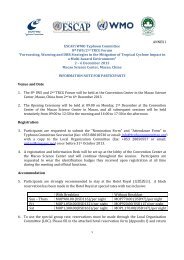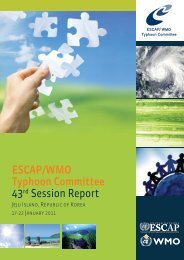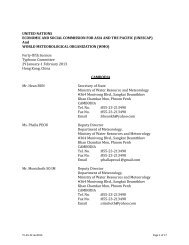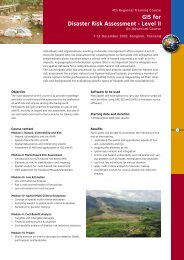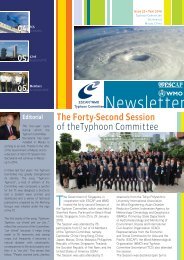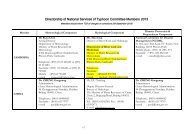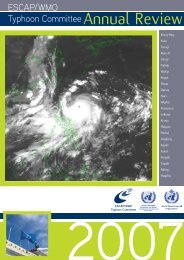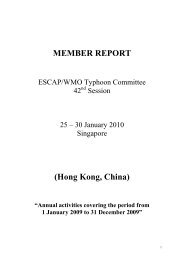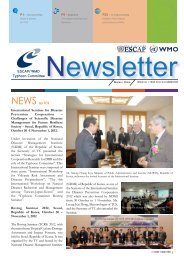TCAR - Typhoon Committee
TCAR - Typhoon Committee
TCAR - Typhoon Committee
Create successful ePaper yourself
Turn your PDF publications into a flip-book with our unique Google optimized e-Paper software.
- Attachment of <strong>Typhoon</strong> Forecasters from<br />
China and Malaysia for <strong>Typhoon</strong> Operational<br />
Forecasting Training at RSMC Tokyo-<strong>Typhoon</strong><br />
Center (Tokyo, Japan, 22-31 July 2009);<br />
- The ESCAP/WMO <strong>Typhoon</strong> <strong>Committee</strong><br />
Integrated Workshop on Building Sustainability<br />
and Resilience in High Risk Area of the <strong>Typhoon</strong><br />
<strong>Committee</strong>: Assessment and Action (Cebu,<br />
Philippines, 14-18 September 2009);<br />
- The Eighth Southern Hemisphere Training<br />
Course on Tropical Cyclones (Melbourne,<br />
Australia, 29 September - 9 October 2009);<br />
- Storm Surge Attachment Training at IIT<br />
(Delhi, India, 28 September - 10 October 2009);<br />
- The Second International Workshop on<br />
Tropical Cyclone Landfall Processes (Shanghai,<br />
China, 19-23 October 2009);<br />
- The Sixth Tropical Cyclone RSMCs/TCWCs<br />
Technical Coordination Meeting (Brisbane,<br />
Australia, 2-6 November 2009);<br />
- Attachment of two forecasters from Cook<br />
Islands and Samoa for the on-the-job training on<br />
operational analysis and forecasting of tropical<br />
cyclone at the RSMC Nadi Tropical Cyclone<br />
Centre (Fiji, 23 November – 4 December 2009).<br />
4.2.2 Activities under the general component<br />
The main activities under the general component<br />
continued to be directed towards the publication of<br />
manuals and reports, which provide information<br />
and guidance to Members to assist them in the<br />
increased application of scientific knowledge and<br />
technology for the improvement of warning and<br />
disaster prevention and preparedness systems<br />
corresponding Expected Results I and VI on<br />
enhanced capabilities of forecasting and warning<br />
service delivery and disaster risk reduction.<br />
Under this component, attention was also given<br />
to the broader aspects of training under the TCP.<br />
Priorities were given to capacity building to<br />
address the issue of sustainable development<br />
with emphases particularly on attachments of<br />
forecasters from developing countries at the<br />
different Regional Specialized Meteorological<br />
Centres (RSMCs) during the cyclone season and<br />
storm surge/wave experts at the Indian Institute<br />
of Technology in Kharagpur, India, a number of<br />
workshops and a joint training event in cooperation<br />
with the Public Weather Service Programme,<br />
and a number of Working Group (<strong>Committee</strong>)<br />
<strong>TCAR</strong><br />
CHAPTER 4 - WMO TROPICAL CYCLONE NEWS<br />
sessions co-joint with Disaster Risk Reduction<br />
Programme. These activities are in accordance<br />
with the programme’s objective to facilitate the<br />
transfer of knowledge and technology to improve<br />
the institutional efficiency of the NMHSs leading<br />
to the provision of better tropical cyclone track<br />
and intensity forecasts and associated flood and<br />
storm surge forecasts, and coordinated actions<br />
towards tropical cyclone disaster risk reduction.<br />
The TCP home page within the WMO Web site<br />
http://www.wmo.int/pages/prog/www/tcp/<br />
index_en.html is continuously being updated.<br />
In addition, the TCP Forecaster’s website has<br />
started to develop for purpose of technology<br />
transfer under changing environment.<br />
WMO continued to be engaged in the services<br />
of Systems Engineering Australlia Pty Ltd (SEA)<br />
to undertake reviews and assessments that<br />
would lead to the recommendation of suitable<br />
conversion factors between the WMO 10-minute<br />
standard average wind and 1-minute, 2-minute<br />
and 3-minute “sustained” winds. The SEA<br />
submitted to the final report in January 2009,<br />
with one page executive summary for the final<br />
review at this meeting. This undertaking is trying<br />
to determine the conversion factors connecting<br />
the various wind averaging periods and its<br />
subsequent inclusion into the Global Guide to<br />
Tropical Cyclone Forecasting and the Operational<br />
Plans/Manual of the TC regional bodies.<br />
Tropical cyclone news for the WMO news website<br />
http://www.wmo.int/pages/mediacentre/news/<br />
index_en.html will be continuously provided for<br />
facilitating media outreach.<br />
The Global Guide to Tropical Cyclone Forecasting<br />
has been undertaking updating, and is expected<br />
to have the first reviewed version in January<br />
2010. After completion, it will be posted to the<br />
TCP Forecaster’s website for widespread access<br />
by forecasters and researchers around the globe.<br />
4.2.3 Activities under the regional component<br />
Many activities of the TCP were carried out under<br />
the regional component with a view to minimizing<br />
tropical cyclone disasters through close regional<br />
cooperation and coordination. Major emphasis<br />
was placed on improvement in the accuracy of<br />
the forecasts, provision of timely early warnings<br />
and on the establishment of necessary disaster<br />
preparedness measures. Each of the tropical<br />
2009<br />
263



